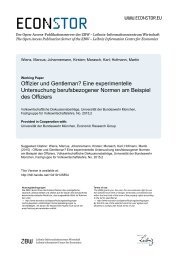DISCUSSION
n?u=RePEc:iza:izadps:dp10283&r=exp
n?u=RePEc:iza:izadps:dp10283&r=exp
You also want an ePaper? Increase the reach of your titles
YUMPU automatically turns print PDFs into web optimized ePapers that Google loves.
Chase, J.A., Houmanfar, R., Hayes, S.C., Ward, T.A., Vilardaga, J.P., and Follette,<br />
V. (2013). Values are not just goals: Online ACT-based values training adds to goal setting<br />
in improving undergraduate college student performance. Journal of Contextual Behavioral<br />
Science, 2(3): 79–84<br />
Choi, J.J., Haisley, E., Kurkoski, J., and Massey, C. (2016). Small cues change savings<br />
choices. Mimeo, Yale University<br />
Church, M.A., Elliot, A.J., and Gable, S.L. (2001). Perceptions of classroom environment,<br />
achievement goals, and achievement outcomes. Journal of Educational Psychology, 93(1):<br />
43–54<br />
Cohodes, S.R. and Goodman, J.S. (2014). Merit aid, college quality, and college completion:<br />
Massachusetts’ Adams scholarship as an in-kind subsidy. American Economic Journal:<br />
Applied Economics, 6(4): 251–285<br />
Corgnet, B., Gómez-Miñambres, J., and Hernán-Gonzalez, R. (2015). Goal setting<br />
and monetary incentives: When large stakes are not enough. Management Science, 61(12):<br />
2926–2944<br />
Cornwell, C.M., Lee, K.H., and Mustard, D.B. (2005). Student responses to merit scholarship<br />
retention rules. Journal of Human Resources, 40(4): 895–917<br />
Darnon, C., Butera, F., Mugny, G., Quiamzade, A., and Hulleman, C.S. (2009). Too<br />
complex for me! Why do performance-approach and performance-avoidance goals predict exam<br />
performance? European Journal of Psychology of Education, 24(4): 423–434<br />
De Paola, M., Scoppa, V., and Nisticò, R. (2012). Monetary incentives and student achievement<br />
in a depressed labor market: Results from a randomized experiment. Journal of Human<br />
Capital, 6(1): 56–85<br />
DellaVigna, S.D. and Malmendier, U. (2006). Paying not to go to the gym. American<br />
Economic Review, 96(3): 694–719<br />
Dhami, S. (2016). The Foundations of Behavioral Economic Analysis. Oxford: Oxford University<br />
Press<br />
Diamond, P. and Kőszegi, B. (2003). Quasi-hyperbolic discounting and retirement. Journal<br />
of Public Economics, 87(9): 1839–1872<br />
Dobkin, C., Gil, R., and Marion, J. (2010). Skipping class in college and exam performance:<br />
Evidence from a regression discontinuity classroom experiment. Economics of Education<br />
Review, 29(4): 566–575<br />
Duckworth, A.L., Quinn, P.D., and Tsukayama, E. (2012). What No Child Left Behind<br />
leaves behind: The roles of IQ and self-control in predicting standardized achievement test<br />
scores and report card grades. Journal of Educational Psychology, 104(2): 439–451<br />
Duckworth, A.L. and Seligman, M.E. (2005). Self-discipline outdoes IQ in predicting academic<br />
performance of adolescents. Psychological Science, 16(12): 939–944<br />
Duckworth, A.L., Shulman, E.P., Mastronarde, A.J., Patrick, S.D., Zhang, J., and<br />
Druckman, J. (2015). Will not want: Self-control rather than motivation explains the female<br />
advantage in report card grades. Learning and Individual Differences, 39: 13–23<br />
Dynarski, S. (2008). Building the stock of college-educated labor. Journal of Human Resources,<br />
43(3): 576–610<br />
Elliot, A.J. and McGregor, H.A. (2001). A 2× 2 achievement goal framework. Journal of<br />
Personality and Social Psychology, 80(3): 501–519<br />
Fang, H. and Silverman, D. (2009). Time-inconsistency and welfare program participation:<br />
Evidence from the NLSY. International Economic Review, 50(4): 1043–1077<br />
Firpo, S., Fortin, N.M., and Lemieux, T. (2009). Unconditional quantile regressions. Econometrica,<br />
77(3): 953–973<br />
33




